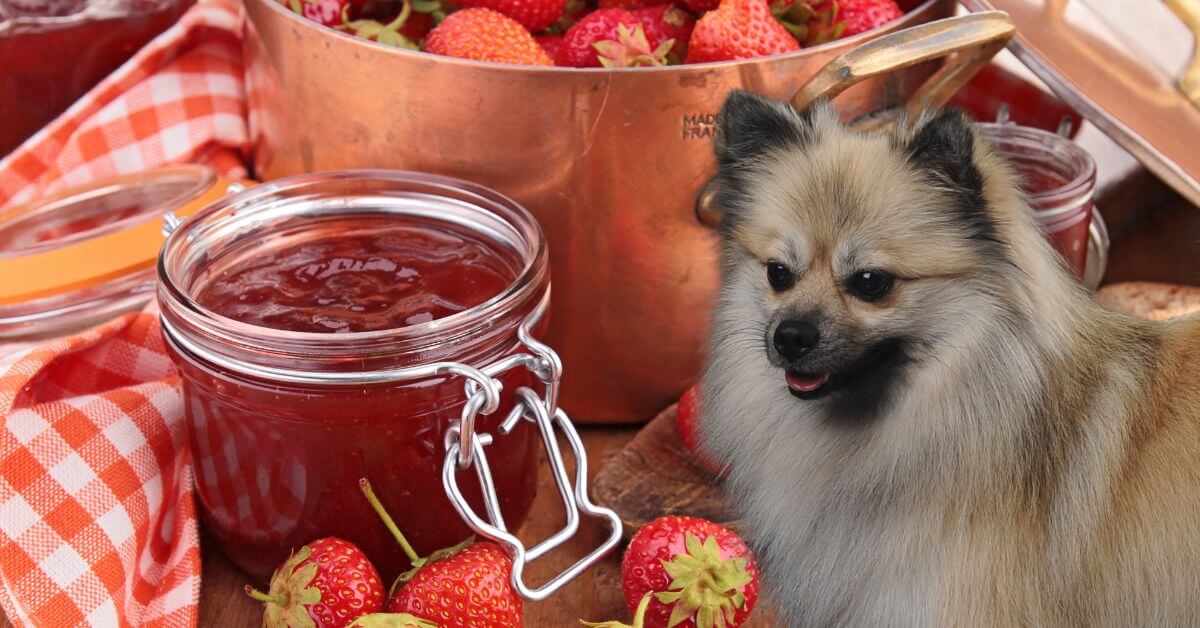Can Dogs Eat Jelly?
No, dogs shouldn’t eat jelly. While it’s tempting to share with your dog, jelly is high in sugar and often contains artificial additives that aren’t good for dogs. Some jellies even have xylitol, a sweetener that’s toxic to dogs. So, if you’re enjoying a PB&J or a dessert with jelly, it’s best to keep it out of reach. Instead, consider healthier snacks that still give a sugar rush – like apples.

In addition, certain types of jellies can be harmful, so in this article, we’re gonna break down the most common types of jelly, whether or not they are toxic, and what you should do if your dog has some. Regular jelly (not the sugar-free version with xylitol) is not toxic. However, it’s absolutely not recommended for dogs. There is a homemade version that you can make and even some dod jelly that you can buy, but where we are, those products are not available. Now, let’s discuss this topic and why your dog shouldn’t eat jelly.
What is jelly made of, and why it’s not safe for dogs
Jelly typically contains several ingredients that can be harmful or lack nutritional value for dogs. Here’s a breakdown of common jelly ingredients and their effects on dogs:
Sugar
Fruit juice or concentrate
Pectin
Citric acid
Artificial sweeteners (e.g., xylitol)
Artificial flavors
Artificial colors
Preservatives (e.g., sodium benzoate, potassium sorbate)
What will happen if your dog eats some jelly or peanut butter and jelly?
Not much! Please don’t worry; there’s no way they can get poisoning or anything remotely dangerous. The thing is, even if the jelly had fruit that’s not safe for them (like grape jelly), during the cooking process, the fruit gets mushed and stripped of the nutrients, and that includes the toxins!
Can dogs eat grape jelly?
Let’s talk about grape jelly first since it’s a common concern. No, please don’t be alarmed. A dog would need to ingest about half of a grape per pound of body weight before the possibility of grape toxicity should be considered. For example, a 70 lb Labrador would need to ingest 35 grapes, which surely isn’t present in one peanut butter and grape jelly sandwich. In the rare case that the grape jelly is sweetened with xylitol—an artificial sweetener—our dogs can become hypoglycemic when eating a significant amount. So, it’s always best to keep any xylitol-sweetened products away from your pets. If your dog had some, please call your vet as soon as possible!
Strawberry, mint, coconut jelly — paws off, or are they okay?
The good news is that strawberries aren’t toxic to dogs. While strawberry jelly has a lot of sugar, which isn’t great for dogs, it won’t cause any immediate harm if your dog eats a small amount. Just remember that too much sugar isn’t good for them, so keep it as an occasional treat if at all.
Mint jelly, coconut jelly, and raspberry jelly also fall into the category of “okay in small amounts but not ideal.” Mint jelly often has sugar and sometimes artificial flavors, which aren’t great for dogs. Coconut jelly can be high in sugar and calories but is generally safe in small quantities. Like strawberry jelly, raspberry jelly is high in sugar but otherwise safe for dogs in moderation.
In summary, while it’s not ideal for dogs to eat jelly due to its high sugar content and potential artificial additives, a small accidental intake is not a cause for alarm. Always watch your dog for any unusual symptoms if they do get into the jelly, and consult your vet if you have any concerns.
Love, life and fur forever!
FAQs
Can dogs eat grape jelly?
No, dogs shouldn’t eat grape jelly. While small amounts may not be immediately harmful, it can upset their stomach. A good rule of thumb is always to avoid grape-flavored products, but grape-flavored products are not as toxic as grapes are, so don’t worry. Just another note: please check for harmful ingredients like xylitol.
Can dogs eat strawberry jelly?
Dogs can eat strawberry jelly in small amounts. However, it’s high in sugar and lacks nutritional benefits. For a healthier alternative, give fresh strawberries.
Can dogs eat grass jelly?
Grass jelly isn’t toxic to dogs, but it’s not particularly nutritious either. It often contains sugar and other additives, so it’s best to avoid giving it to your dog.
Can dogs eat mint jelly?
Dogs shouldn’t eat mint jelly due to its high sugar content and possible artificial flavors. It’s not toxic, but it’s not beneficial for them either.
Can dogs eat coconut jelly?
Coconut jelly is safe for dogs in small quantities. It’s high in sugar and calories, so it’s best to offer it sparingly.
Can dogs eat raspberry jelly?
Dogs can eat raspberry jelly in small amounts, but it’s high in sugar. Fresh raspberries are a much healthier option for your dog.
Can dogs eat konjac jelly?
Konjac jelly isn’t toxic to dogs, but it’s not recommended. It can be hard to digest and often contains additives that aren’t good for dogs. Stick to safer treats.